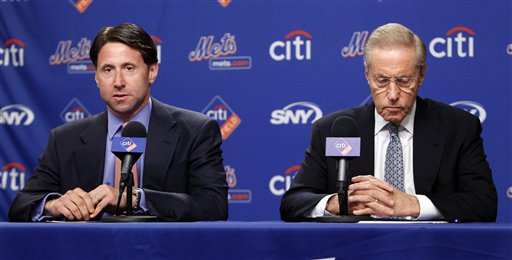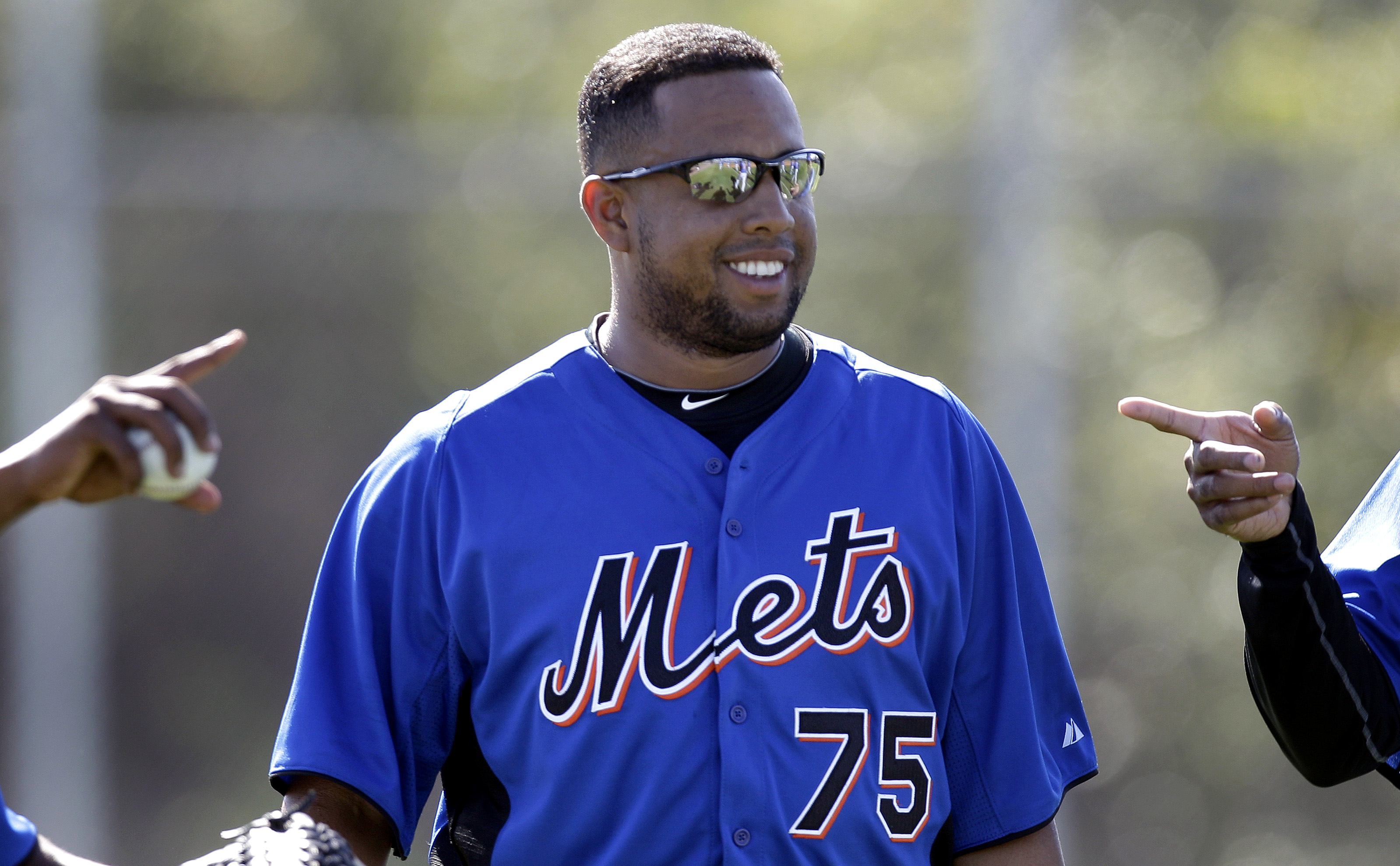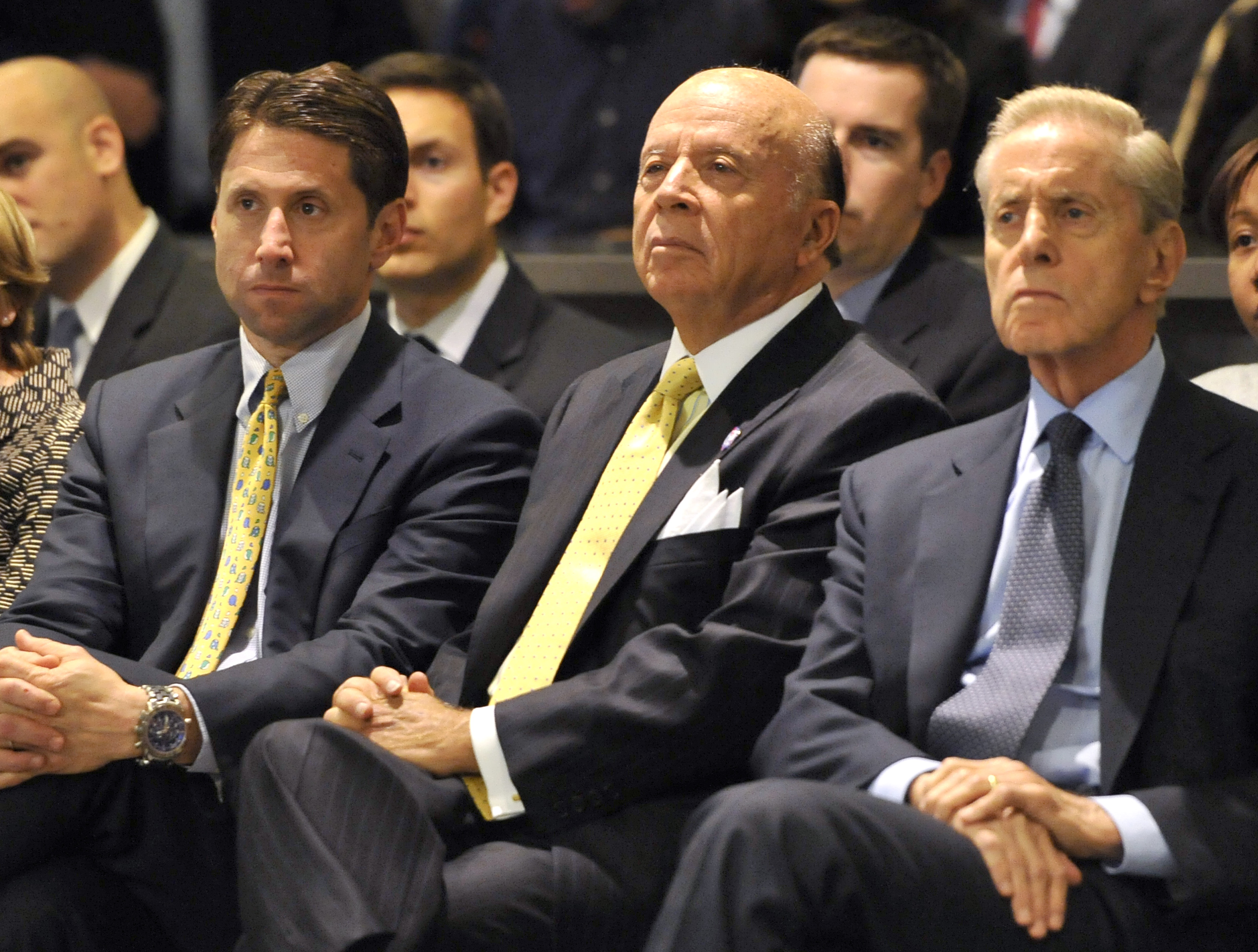

A study in contrasts: New York Mets owner and CEO Fred Wilpon, right, and COO Jeff Wilpon speak to the media during a news conference on Monday, Oct. 4, 2010, at Citi Field in New York. The New York Mets fired manager Jerry Manuel and general manager Omar Minaya on Monday, an expected shake-up of the big-spending ballclub after its second straight losing season. The Mets said a search is under way for a new GM, who will work with the team to hire a new manager. (AP Photo/Seth Wenig)
The inevitable came to fruition on Monday, when the Mets relieved GM Omar Minaya of his duties and declined the 2011 option of manager Jerry Manuel, effectively conceding that it’s time to start over.
There was another apologetic news conference, of which there are more than good seasons recently, it seems.
Jeff Wilpon, living up to his reputation as a tempestuous type, was resolute when asked whether the Mets’ next GM would have full autonomy over baseball operations.
“The old general manager had that,” Wilpon said curtly.
But to me, the takeaway from the afternoon’s rendezvous came from Jeff’s dad, Fred.
Fred was defending, in a roundabout way, Minaya’s tenure as GM. He said that there was a time in the not-too-distant past that Minaya had the Mets on the right track and was so popular that he could have been elected the mayor or governor of New York. It was hyperbole, of course, but Wilpon’s point was clear — the Mets were winning and all was right in Flushing.
The funny thing is that all was not right, as we would find out in the coming seasons, despite all the good vibes and cover stories about the melting-pot Mets. And that compulsion for instant gratification without regard for how it’s attained is what fosters the Mets’ state of perpetual mediocrity. Sure, there are good times intermittently, because poorly constructed teams (especially ones with deep pockets) can luck into a couple decent seasons. But eventually, usually sooner than later, it catches up to you. And that’s where the Mets are, and that’s where they probably will be without some pretty significant changes in their approach.
Minaya was not incompetent. Personally, I’d rank him right about average as far as GMs go. That should allow for a fair measure of natural variation in his teams’ performance, right? Luckily for Minaya, his second season at the helm was his best, earning him four years of cache to let the team atrophy on his watch. Well, really, the teams didn’t atrophy. They just sort of returned to the norm — they averaged out.
But that one exceptional season was good enough for the Wilpons and the Mets to think that their GM was doing things the right way. And I’m not sure we can fault them for that. If you don’t really understand the machinations of baseball operations, how could you effectively judge whether your GM’s Process™ is sound? On Monday, the Wilpons admitted that they’re not baseball people. They said, in no uncertain terms, that they don’t interfere in baseball operations (disputed as this may be). So, responsible as they may be for Minaya’s hiring, it’s hard to blame them for being complicit in his dubious roster management.
Minaya, though, well … he is a baseball person. So, it stands to reason that his lone great year was enough to delude him into thinking that he was doing things the right way. Sometimes, when you’re successful, you don’t mess with the formula that got you there. You keep doing what you’ve always done.
In Minaya’s case, he was an old scout — a “talent evaluator,” as they like to say. He wasn’t much of a stat head, by his own admission. He had an eye for talent, and he brought in talented players — usually on the cheap because they were busts and washups. And that’s why, at various times, the Mets took on the Oliver Perezes and John Maines and Jose Valentins and Luis Castillos and Jeff Francoeurs and Carlos Delgados and Guillermo Motas and Jorge Julios and Ambiorix Burgoses of the world. Sure, some of them worked out for a time. But eventually, age or suckiness caught up.
I’ve grown to like Fred quite a bit recently, perhaps because I see him and Jeff as a study in contrasts. Sure, they have the same surname, and they sort of look alike, but Fred is far more likable. He comes off as sympathetic to Mets fans; he seems to understand their frustrations and anxieties. Jeff, meanwhile, comes off as whiny, and he responds to criticism with indignation.
But, Fred … well … he frustrated me on Monday. After he talked about Minaya’s approval rating from a few years ago, he didn’t really finish his thought. Rather, he couldn’t finish the thought. He said, let’s not forget how popular Minaya was then, but things have since gone sour somehow, and that’s just how it goes sometimes.
And then, the conversation changed course when a reporter asked a different question. But what Fred couldn’t verbalize is that things don’t just go bad by happenstance. They went bad because the foundation was never in place for long-term success.
Impatient ownership + overzealous, eager-to-spend GM = long-term failure
In a way, Minaya’s and the Wilpons’ marriage was one of convenience, one that made a great deal of sense at the time but was painfully shortsighted. The Wilpons were desperate for instant credibility after bottoming out for four seasons in the wake of a World Series appearance in 2000. Minaya, as detailed in that now-infamous Sports Illustrated cover story, was desperate for another shot at the helm after his brief and moderately successful stint as the Expos GM, when Montreal had a foot out the door. That chance was nonexistent; he had interviewed for several jobs but was always a bridesmaid.
When the gig with the Mets presented itself, it just felt right for both sides. Minaya could give the Wilpons what they wanted more than anything — a winner in short order — if he could just convince them to write some fat checks. It was a deal with the devil for both sides of the arrangement. And so it was.
Now, Minaya has washed out, his deficiencies exposed in the six years since he was appointed GM. We’ve literally seen the game pass him by, strangely. In a bygone era, he might have survived this, may even have been an above-average GM. But the game kept changing, and Minaya kept staying the same. There’s an ongoing axiom I keep hearing about Minaya: He was playing checkers while everyone else was playing chess.
But none of that matters now, at least not for the Mets. They’re charged with changing, too. The Wilpons must now do what they didn’t do in 2004, when they hired Minaya. They must concede that building a winning team for the long term is the objective, and that may have to come at the expense of victories in the short term.
Will they have the patience to allow a big-picture-thinking GM like Terry Ryan or Sandy Alderson or Pat Gillick to move the franchise in that direction? Will they grow restless with a long-term plan if it leads to another 78-win season or two? Can they stomach the idea of conceding the big stage to Big Bro for a while longer?
Minaya, for his part, isn’t sure it can be done. Toward the end of this season, when it was becoming increasingly obvious that his time here was growing short, he said he wasn’t sure whether a New York team could build for the future.
Frankly, I think it can be done. Sometimes, the right moves aren’t the most popular ones. They may not get you elected as mayor or governor of New York, but you’ll walk away being remembered as a pretty good general manager.
Dan Mennella is a reporter and editor for MLB.com. Check out his blog, danmennella.com, and follow him on Twitter @danmennella.





